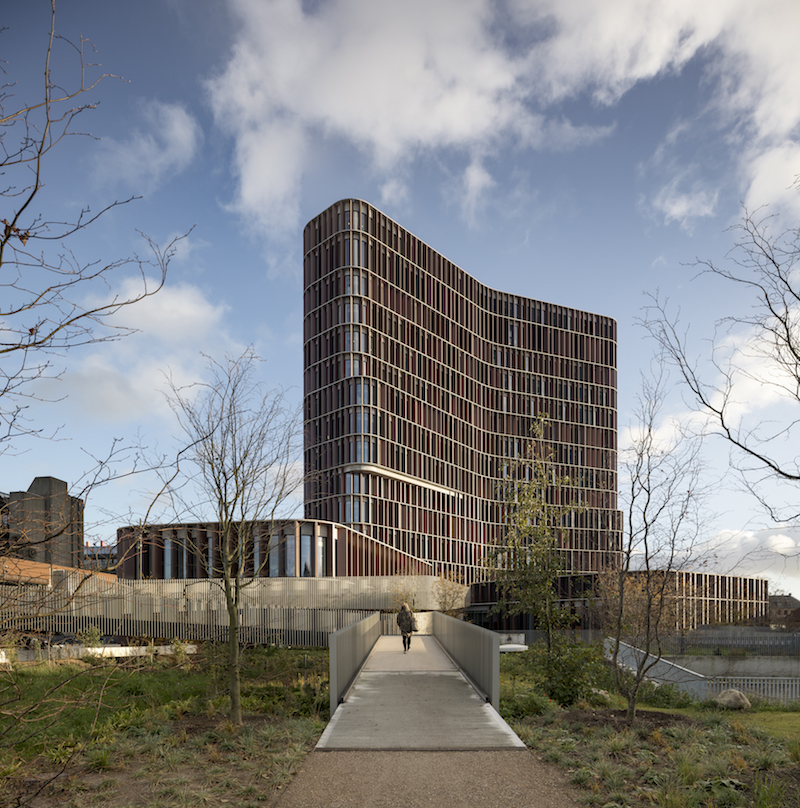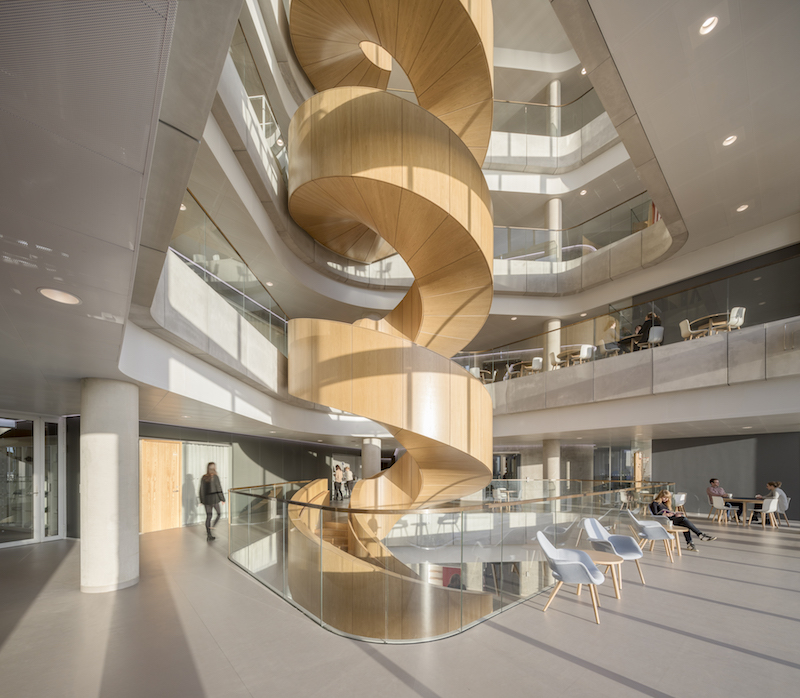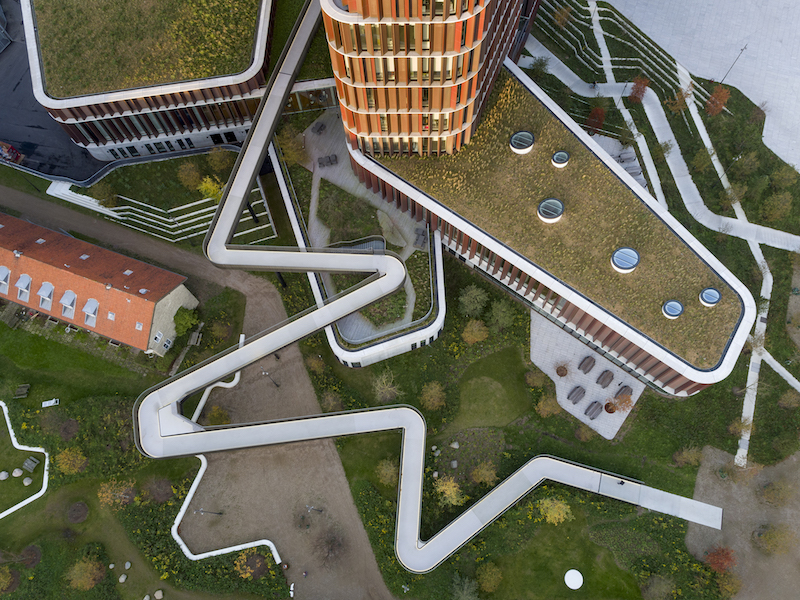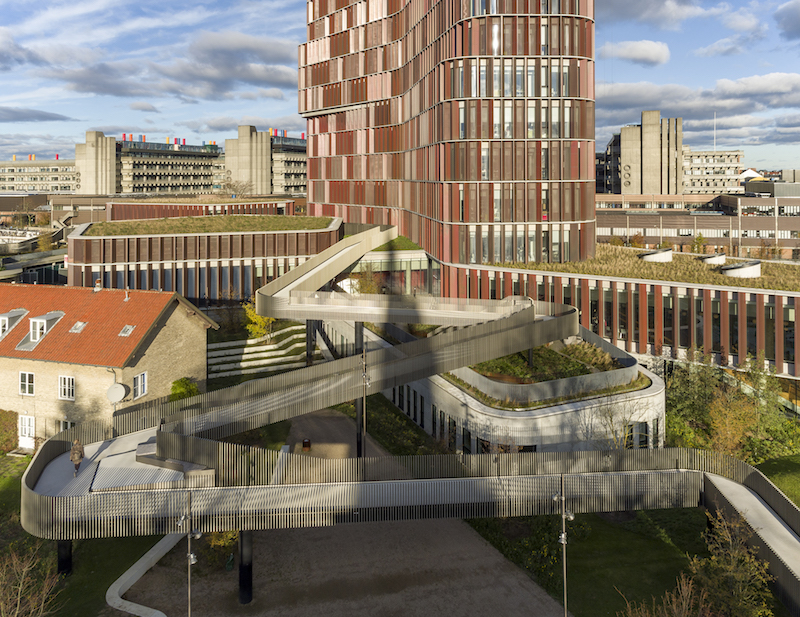Maersk Tower is a new 42,700-sm research building designed and built as an extension of Panum, the University of Copenhagen’s Faculty of Health Sciences. The new building includes research and teaching facilities and a conference center with auditoriums and meeting rooms.
The tower rests on a low base that comprises all common facilities. The base is publicly accessible and appears open and in close dialogue with the surrounding environment thanks to its glass façade. The research functions and laboratories are located in the tower itself and are bound to each other in a loop that provides short distances between locations and improves the possibility of collaboration.
 Photo: Adam Mørk.
Photo: Adam Mørk.
An open atrium and a spiral stairway visually and physically connects each of the building’s fifteen floors. A “Forskertorv” exists around the staircase and creates a natural meeting place and community room for the building’s users.
Maersk Tower’s exterior façade is divided into a grid structure of floor-high copper-plated shutters. The shutters act as a climate guard that moves and shields direct sunlight and overheating. The shutters also help to break down the tower’s large scale. Adding to the energy efficiency of the building, the laboratories capture waste energy and reuse it for other purposes.
 Photo: Adam Mørk.
Photo: Adam Mørk.
Surrounding the tower is a publicly available urban campus park equipped with a “floating trail” that leads pedestrians and cyclists across part of Maersk Tower and creates a new connection between Nørre Allé and Blegdamsvej.
 Photo: Adam Mørk.
Photo: Adam Mørk.
Related Stories
| Aug 11, 2010
Living and Learning Center, Massachusetts College of Pharmacy & Health Sciences
From its humble beginnings as a tiny pharmaceutical college founded by 14 Boston pharmacists, the Massachusetts College of Pharmacy & Health Sciences has grown to become the largest school of its kind in the U.S. For more than 175 years, MCPHS operated solely in Boston, on a quaint, 2,500-student campus in the heart of the city's famed Longwood Medical and Academic Area.
| Aug 11, 2010
Giants 300 University Report
University construction spending is 13% higher than a year ago—mostly for residence halls and infrastructure on public campuses—and is expected to slip less than 5% over the next two years. However, the value of starts dropped about 10% in recent months and will not return to the 2007–08 peak for about two years.
| Aug 11, 2010
Team Tames Impossible Site
Rensselaer Polytechnic Institute, the nation's oldest technology university, has long prided itself on its state-of-the-art design and engineering curriculum. Several years ago, to call attention to its equally estimable media and performing arts programs, RPI commissioned British architect Sir Nicholas Grimshaw to design the Curtis R.
| Aug 11, 2010
Setting the Green Standard For Community Colleges
“Ohlone College Newark Campus Is the Greenest College in the World!” That bold statement was the official tagline of the festivities surrounding the August 2008 grand opening of Ohlone College's LEED Platinum Newark (Calif.) Center for Health Sciences and Technology. The 130,000-sf, $58 million community college facility stacks up against some of the greenest college buildings in th...
| Aug 11, 2010
University of Arizona College of Medicine
The hope was that a complete restoration and modernization would bring life back to three neoclassic beauties that formerly served as Phoenix Union High School—but time had not treated them kindly. Built in 1911, one year before Arizona became the country's 48th state, the historic high school buildings endured nearly a century of wear and tear and suffered major water damage and years of...
| Aug 11, 2010
Cronkite Communication School Speaks to Phoenix Redevelopment
The city of Phoenix has sprawling suburbs, but its outward expansion caused the downtown core to stagnate—a problem not uncommon to other major metropolitan areas. Reviving the city became a hotbed issue for Mayor Phil Gordon, who envisioned a vibrant downtown that offered opportunities for living, working, learning, and playing.







